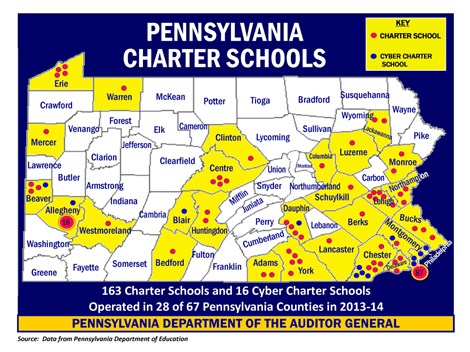Auditor General DePasquale Releases Charter School Report, Recommends Creation of Independent Oversight Board
Makes recommendations to improve accountability, effectiveness, transparency
Auditor General DePasquale Releases Charter School Report, Recommends Creation of Independent Oversight Board
Makes recommendations to improve accountability, effectiveness, transparency
Click here for the Special Report on Charter Schools
HARRISBURG (May 12, 2014) – Following up on a series of public meetings held earlier this year, Auditor General Eugene DePasquale today issued his report with recommendations to improve accountability, effectiveness and transparency of charter schools, including creating an independent statewide charter school oversight board.
“Charter schools are here to stay and clearly thousands of parents welcome having a choice when it comes to sending their children to public schools,” DePasquale said in releasing the report, Pennsylvania Charter School Accountability and Transparency: Time for a Tune-Up.
“Many outstanding charter schools in the state are doing amazing things for children and offering new ways to learn. However, based on our audits and feedback at meetings across the state, it’s clear that the original intention of the charter school law has not been fulfilled. We owe it to students, parents and taxpayers to re-group and make some fundamental changes to improve oversight and accountability of charter schools in Pennsylvania.”
The auditor general said he found two common themes in the public meetings and audits of school districts and charter schools: school districts and charter schools continue to struggle with often confusing statutory and regulatory provisions of the 1997 charter school law; and improvements are needed in the unpredictable, inconsistent and sometimes nonexistent guidelines from the commonwealth.
“Many people on both sides of the charter school issue indicated that there is a clear lack of direction and oversight at the state level and that causes huge problems,” DePasquale said. “In fact, several participants in the public meetings compared the current situation to the ‘wild, wild west.’ I encourage the General Assembly and the governor to act swiftly to the address the changes needed in charter school accountability and oversight.”
To address oversight and resource issues, DePasquale recommends creating a new independent statewide charter school oversight board that would:
- act as an effective and prompt resource to address charter-related issues raised by school districts and charter schools, including providing clarification on statutory provisions, regulations, guidelines and other questions that arise;
- enforce statutory provisions, regulations, and guidelines in areas including lease reimbursement, student enrollment, Right-to-Know Law requests, ethics requirements, charter reauthorization and revocation;
- train school districts to be effective authorizers of charter schools;
- develop and implement a new charter school appeals process to replace the current process that involves years of costly appeals and court proceedings; and
- serve as a repository and publisher of best practices information for both the charter schools and school districts.
In addition to creating the statewide oversight board, DePasquale also recommends that the commonwealth:
- reinstitute the charter school tuition reimbursement from the state to offset charter school tuition paid by school districts;eliminate cyber charter school payments from school districts and replace with direct funding from the state;
- overhaul the charter school annual report template and require charter schools to verbally present their report to the authorizing school district in a public meeting;
- impose the same limits on charter school fund balances as imposed on school districts, but provide for a waiver process for certain exemptions such as construction or renovation projects;
- change regulations to allow the Department of Education’s special education division to serve as the intermediary between charter schools and school districts when a student classification is in dispute;
- create a tiered funding mechanism for special education;mandate implementation of a standard, statewide charter school student admissions form and lottery admission system and prohibit schools from requiring submission beyond standard identification details and residency requirements;require charter schools to have the same teacher and principal performance evaluations as school districts and establish guidelines on how charters should calculate the 75 percent-of-teachers-certified requirement;
- allow noncompliance with the Right-to-Know Law to be a factor in charter school renewal decisions;
- create a website that would clearly identify expenditures for charter schools and traditional public schools that would include information on vendor contracts, superintendent buyouts, leases and transportation costs; and
- require charter schools to request and receive a timely public hearing and school district vote on approval from the authorizing school district for any amendment or new contract for educational services.
“The bottom line is this: we owe it to our children and to the taxpayers of Pennsylvania to make sure that we are doing everything possible so that students are getting the best education available and that we are getting the best return on investment for our tax dollars,” DePasquale said.
During public meetings in February and March in Allegheny, Bucks, Cambria, Northampton, and Philadelphia counties DePasquale heard testimony on charter schools from a wide cross-section of experts and advocates, including representatives of school districts, charter schools, educational associations, business and industry groups and citizen organizations.
Pennsylvania has more than 84,000 students enrolled in more than 160 brick-and-mortar charter schools and 35,000 students enrolled in 16 cyber charter schools.
# # #
Return to search results